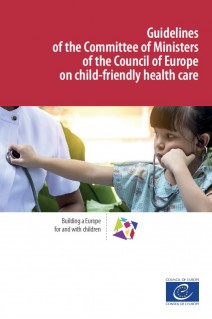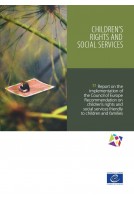



Children need a health care system that is accessible, takes into account their rights, their needs, their feelings and opinions.
The Guidelines on child-friendly health care were adopted by the Committee of Ministers in 2011. They are designed to provide a framework to ensure that health care systems operate in line with good practices in children’s health care, in line with commitments under the United Nations Convention on the Rights of the Child, the European Social Charter as well as other relevant international and European standards. They thus offer Council of Europe member states a set of practical directions to assist them in improving their healthcare systems and services while implementing a child-friendly health care approach.
This publication contains the Guidelines and their Explanatory memorandum, the latter including a summary of views on the health care experiences of children and young people in 22 Council of Europe member states, which informed the preparation of these guidelines.
The resulting Guidelines are thus a reaffirmation of principles applicable to children’s health services and the promotion of a child-friendly health care approach, namely participation, promotion, protection, prevention and provision, illustrated through examples and promising practices.
This publication aims to support agencies, organisations and professional groups contributing to services for children and families, in particular policy makers, health, education and social care practitioners throughout Europe.
FOREWORD
GUIDELINES ON CHILD‑FRIENDLY HEALTH CARE
Preamble
I. Object and purpose
II. Definitions
III. Principles of the child-friendly health care approach
IV. The child-friendly health care approach
V. Implementing the child-friendly health care approach
VI. Promoting the child-friendly health care approach
EXPLANATORY MEMORANDUM TO THE GUIDELINES ON CHILD‑FRIENDLY HEALTH CARE
General comments
Introduction
I. Object and purpose of the child-friendly health care approach
II. Definitions
III. Principles of the child-friendly health care approach
IV. The child-friendly health care approach
V. Implementing the child-friendly health-care approach
VI. Promoting the child-friendly health care approach
APPENDICES
Appendix I – Child-friendly health care: the views and experiences of children and young people in Council of Europe member states
Appendix II – Synopsis and aide mémoire – the 5-4-3-2-1 approach












Children need a health care system that is accessible, takes into account their rights, their needs, their feelings and opinions.
The Guidelines on child-friendly health care were adopted by the Committee of Ministers in 2011. They are designed to provide a framework to ensure that health care systems operate in line with good practices in children’s health care, in line with commitments under the United Nations Convention on the Rights of the Child, the European Social Charter as well as other relevant international and European standards. They thus offer Council of Europe member states a set of practical directions to assist them in improving their healthcare systems and services while implementing a child-friendly health care approach.
This publication contains the Guidelines and their Explanatory memorandum, the latter including a summary of views on the health care experiences of children and young people in 22 Council of Europe member states, which informed the preparation of these guidelines.
The resulting Guidelines are thus a reaffirmation of principles applicable to children’s health services and the promotion of a child-friendly health care approach, namely participation, promotion, protection, prevention and provision, illustrated through examples and promising practices.
This publication aims to support agencies, organisations and professional groups contributing to services for children and families, in particular policy makers, health, education and social care practitioners throughout Europe.
Please note that in accordance with our terms & conditions, PDF/epubs may only be purchased by private individuals.
